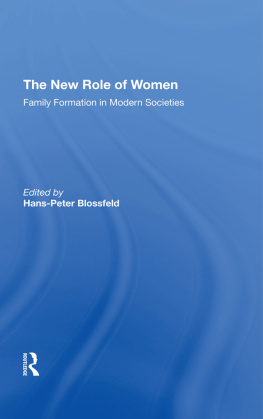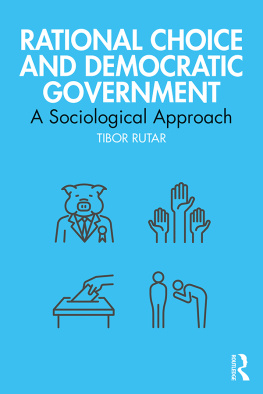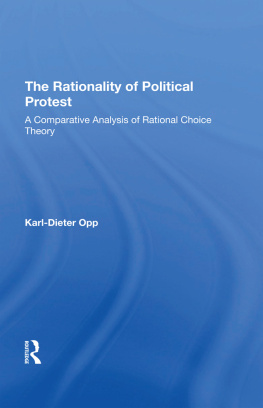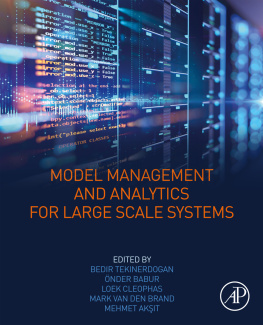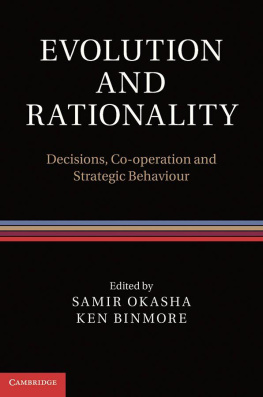First published 1998 by Westview Press
Published 2019 by Routledge
52 Vanderbilt Avenue, New York, NY 10017
2 Park Square, Milton Park, Abingdon, Oxon OX14 4RN
Routledge is an imprint of the Taylor & Francis Group, an informa business
Copyright 1998 Taylor & Francis
All rights reserved. No part of this book may be reprinted or reproduced or utilised in any form or by any electronic, mechanical, or other means, now known or hereafter invented, including photocopying and recording, or in any information storage or retrieval system, without permission in writing from the publishers.
Notice:
Product or corporate names may be trademarks or registered trademarks, and are used only for identification and explanation without intent to infringe.
A CIP catalog record for this book is available from the Library of Congress.
ISBN 13: 978-0-367-28500-5 (hbk)
Hans-Peter Blossfeld is professor of sociology and social statistics at the University of Bremen. He is interested in youth, family, and educational sociology; studies of the labor market; and research in demography, as well as social stratification and mobility. He has written and edited several books including Techniques of Event History Modeling (with Gtz Rohwer, 1995); Persistent Inequality: Changing Educational Attainment in Thirteen Countries (edited with Yossi Shavit, 1993); The New Role of Women: Family Formation in Modern Societies (1995); and Between Equalization and Marginalization: Women Working Part-Time in Europe and the United States of America (edited with Catherine Hakim, 1997).
Gerald Prein is a senior research scientist at the Special Research Centre 186 "Status Passages and Risks in the Life Course" and a lecturer of sociological methodology and statistics at the University of Bremen. His main interests are research in the sociology of social problems and social control, and methods for longitudinal analysis.
Sebastian Bamberg studied psychology and is working as an associated researcher at the department of social science of the university of Giessen. His main research interest is applying rational choice theory in the context of ecologically relevant behaviors.
Robert Erikson is professor of sociology at the Swedish Institute for Social Research, Stockholm University, and a Fellow of the Royal Swedish Academy of Sciences. His previous publications include Welfare in Transition: A Survey of Living Conditions in Sweden 1968-1981 (with Rune berg), 1987; The Constant Flux: A Study of Class Mobility in Industrial Societies (with John Goldthorpe), 1992; and Can Education Be Equalized: The Swedish Case in Comparative Perspective (with Jan O. Jonsson), 1996. His present research interests concern the study of the interconnection of family, work, and education over the life course.
Hartmut Esser studied economics and sociology at the University of Cologne. At present he holds a chair in the sociology and philosophy of science at Mannheim University. His publications include: Soziale Regelmigkeiten des Befragtenverhaltens (1975), Wissenschaftstheorie (2 vols.) 1977, Aspekte der Wanderungssoziologie (1980), Generation und Identitt (with Jrgen Friedrichs, 1990), Alltagshandeln und Verstehen: Zum Verhltnis von erklrender und verstehender Soziologie am Beispiel von Alfred Schtz und Rational Choice (1991), Modellierung sozialer Prozesse (with Klaus Troitzsch, 1991) and Soziologie (Allgemeine Grundlage) (1993).
John H. Goldthorpe is an Official Fellow at Nuffield College, Oxford, and a Fellow of the British Academy of Sciences. His main research interests are in social stratification and comparative microsociology. His most recent book is (with Robert Erikson) The Constant Flux: A Study of Class Mobility in Modern Societies (1992). He is also the author of Social Mobility and Class Structures in Modern Britain (2nd edition 1987) and (with David Lockwood and others) The Affluent Worker series (1968-69).
Anthony Heath is professor of sociology at the University of Oxford and a fellow of the British Academy. He is director of the 1997 British Election Study and co-director of the Centre for Research into Elections and Social Trends (CREST). His publications include: Rational Choice and Social Exchange (1976), Social Mobility (1981), How Britain Votes (1985), and Understanding Political Change (1991).
Michael Hechter , professor of sociology at the University of Arizona, has long been interested in the relationship between sociology and rational choice theory. Among his recent books are Principles of Group Solidarity (1987), Social Institutions (1990), and The Origin of Values (1993). He is currently completing a book on nationalism.
Peter Hedstrm is professor of sociology at Stockholm University. He is an associate editor of Rationality and Society and his recent articles have appeared in journals such as American Journal of Sociology, Acta Sociologica, and Work and Occupations. His current work focuses on the diffusion of popular movements in Sweden at the turn of the nineteenth century, and on the role of uncertainty in generating social action.
Udo Kelle is a senior research scientist at the Special Research Centre 186 "Status Passages and Risks in the Life Course" and a lecturer of sociology at the University of Bremen. His major theoretical interests concern theories of action in sociology and its philosophical background as well as social science research methodology. In his empirical research about occupational life courses and family formation of young adults, he attempts to integrate quantitative and qualitative methods. Recent publications cover the area of qualitative methodology (Computer-Aided Qualitative Data analysis, London: Sage 1995; Theory Building in Qualitative Research and Computer Programs for the Management of Textual Data, Sociological Research Online 2 (2), , 1997)
Stanley Lieberson is the Abbott Lawrence Lowell Professor at Harvard University. In addition to substantive work on a variety of topics, he has written extensively about the logic of social research. Lieberson is a former President of the American Sociological Association and is a member of the National Academy of Sciences.
Siegwart Lindenberg received his Ph.D. from Harvard University and is currently professor of Theoretical Sociology at the University of Groningen, the Netherlands, where he divides his time between the department of sociology and the post-graduate institute ICS (the Interuniversity Center for Social Science Theory and Methodology). His main research interests focus on the methodology of explanation in the social sciences, theories of action (especially the combination of rational choice with framing), theories of preferences, and theories of contracting and organization.




